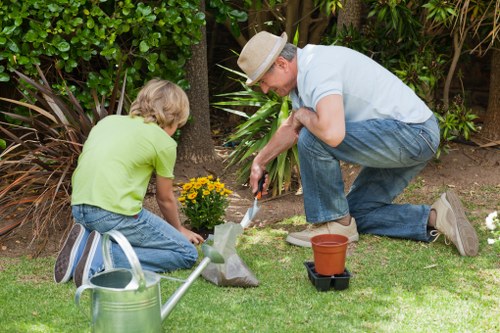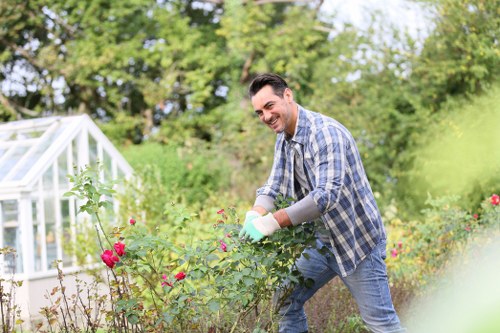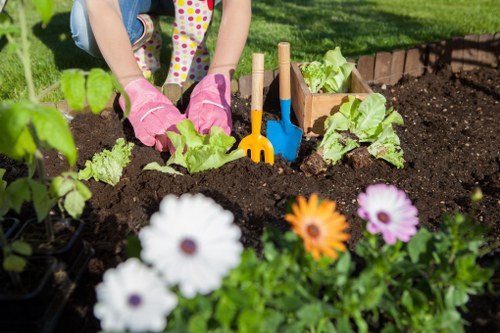Effective Driveway Algae Removal in Stoke Newington

Driveway algae can be a persistent problem for homeowners in Stoke Newington. The damp, shaded conditions common in this area create an ideal environment for algae growth, which not only looks unsightly but can also make your driveway slippery and unsafe. Understanding the best methods for algae removal is essential to maintain the safety and appearance of your property.
Algae thrives in moist environments, often appearing as dark, green patches on concrete or paving stones. In Stoke Newington, the frequent rain and cooler temperatures provide perfect conditions for algae to flourish. If left untreated, algae can cause long-term damage to your driveway, leading to costly repairs.
Addressing driveway algae effectively involves a combination of prevention and treatment. By implementing the right strategies, you can keep your driveway clean and algae-free year-round.
Understanding Algae Growth on Driveways

Algae is a simple plant-like organism that thrives in moist, shaded areas. On driveways, it often grows in the cracks of paving stones or uneven surfaces where moisture accumulates. The presence of algae can indicate poor drainage or inadequate sunlight exposure, both of which contribute to its proliferation.
In Stoke Newington, the combination of urban buildings and limited green spaces means that many driveways receive minimal direct sunlight. This lack of sunlight, coupled with frequent rain, creates the perfect setting for algae growth.
Regular maintenance is crucial to prevent algae from taking hold. Simple measures such as improving drainage, increasing sunlight exposure, and using appropriate cleaning solutions can significantly reduce the risk of algae infestation.
Signs of Algae on Your Driveway

Early detection of algae is key to preventing extensive damage. Here are some common signs to watch for:
- Dark green or black patches on paving stones
- Slippery surfaces, especially when wet
- Discoloration and staining of driveway materials
- Visible growth in cracks and crevices
Noticing these signs early allows you to take prompt action, minimizing the impact on your driveway's appearance and safety.
Ignoring algae growth can lead to more severe problems, including the deterioration of paving stones and increased maintenance costs over time.
Effective Methods for Algae Removal

There are several effective methods for removing algae from your driveway in Stoke Newington. These methods range from DIY solutions to professional treatments, catering to different budgets and preferences.
Choosing the right method depends on the extent of algae growth, the type of driveway material, and your willingness to undertake maintenance tasks.
Below are some of the most effective algae removal techniques:
1. Pressure Washing

Pressure washing is one of the most efficient ways to remove algae from driveways. Using a high-pressure water spray can effectively dislodge algae and other debris from the surface.
For best results, use a pressure washer with adjustable settings to prevent damage to your driveway materials. It's advisable to hire a professional in Stoke Newington who has experience with pressure washing to ensure thorough and safe cleaning.
Regular pressure washing can also help prevent algae from returning by removing spores before they take root.
2. Chemical Cleaners
Chemical cleaners specifically designed to kill algae are another effective option. These cleaners typically contain ingredients like bleach or specialized algae-killing compounds.
When using chemical cleaners, it's essential to follow the manufacturer's instructions carefully to avoid damaging your driveway or surrounding vegetation. Always wear protective gear and ensure proper ventilation if necessary.
Chemical treatments can provide long-lasting results, especially when combined with other preventive measures.
3. Natural Remedies
If you prefer eco-friendly solutions, several natural remedies can help remove algae. One popular method is using a mixture of white vinegar and water. Vinegar's acidic properties effectively kill algae without harming the environment.
Another natural option is baking soda. Sprinkle baking soda directly on the affected areas and scrub with a brush to remove algae deposits.
Natural remedies are a safe and environmentally friendly alternative, though they may require more frequent application compared to chemical cleaners.
Preventing Future Algae Growth
Preventing algae from returning to your driveway is just as important as removing it. Implementing preventive measures can save you time and money in the long run.
Here are some strategies to keep your driveway algae-free:
- Ensure proper drainage to reduce moisture accumulation
- Increase sunlight exposure by trimming surrounding vegetation
- Apply a sealant to your driveway to create a protective barrier
- Regularly clean and maintain your driveway
By maintaining a clean and dry driveway, you create an environment less conducive to algae growth.
Regular inspections and timely maintenance are essential to keep algae at bay.
Improving Drainage
Proper drainage is crucial in preventing algae growth. Standing water provides the perfect habitat for algae. Ensure that your driveway has adequate slope to facilitate water runoff.
If you notice pooling water after rainfall, consider installing additional drainage solutions such as French drains or channel drains to direct water away from your driveway.
Improving drainage not only prevents algae but also protects your driveway from water damage and erosion.
Increasing Sunlight Exposure
Algae thrives in shade, so increasing sunlight exposure can help deter its growth. Trim overhanging branches and remove any other obstructions that block sunlight from reaching your driveway.
Less shade means your driveway will dry more quickly after rain, reducing the moisture that algae needs to survive.
Additionally, more sunlight can enhance the overall appearance of your driveway, making it look cleaner and brighter.
Using Sealants
Applying a sealant to your driveway can provide a protective layer that inhibits algae growth. Sealants make the surface less hospitable to algae by reducing moisture penetration and making it easier to clean.
There are various types of sealants available, including water-based and solvent-based options. Choose a sealant that is compatible with your driveway material for the best results.
Regular reapplication of sealant is necessary to maintain its protective properties.
Choosing a Professional Algae Removal Service in Stoke Newington
While DIY methods can be effective, hiring a professional algae removal service in Stoke Newington ensures thorough and lasting results. Professionals have the expertise and equipment to handle severe algae infestations safely and efficiently.
When selecting a service, consider the following factors:
- Experience and reputation in the local area
- Range of services offered
- Customer reviews and testimonials
- Pricing and value for money
Choosing a reputable company ensures that the job is done correctly, giving you peace of mind and a clean, safe driveway.
Benefits of Professional Services
Professionals offer several advantages over DIY methods:
- Access to specialized equipment and products
- Expert knowledge of effective cleaning techniques
- Time-saving, as the job is completed quickly and efficiently
- Guaranteed results, often with warranties or follow-up services
Hiring professionals can provide a higher level of cleanliness and ensure that algae is completely eradicated.
Moreover, they can offer advice on preventing future growth, tailored to the specific conditions of your Stoke Newington driveway.
Local Relevance: Algae Removal in Nearby Areas
Stoke Newington is surrounded by several neighborhoods that also experience similar algae challenges. Understanding the unique characteristics of these areas can help in addressing algae growth effectively.
- Clissold: Known for its large parklands, Clissold Driveways often suffer from algae due to tree cover and shade.
- Dalston: With its bustling urban environment, Dalston driveways are prone to moisture accumulation from rain and poor drainage systems.
- Shacklewell: Shacklewell's older properties have paved driveways that are particularly susceptible to algae in damp conditions.
- Hackney Central: The mix of residential and commercial areas in Hackney Central affects driveway maintenance needs, including algae removal.
- Haggerston: Haggerston driveways benefit from open spaces but still require regular cleaning to prevent algae.
- Lower Clapton: The proximity to water sources in Lower Clapton increases the likelihood of algae growth on driveways.
- Upper Clapton: Similar to Lower Clapton, Upper Clapton faces challenges with algae due to its lush greenery and moisture levels.
- South Hackney: South Hackney's diverse architecture means varied driveway materials, each needing specific algae treatment methods.
- London Fields: The vibrant community in London Fields demands aesthetically pleasing driveways, making algae removal a priority.
- Stoke Newington Green: Close to the main Stoke Newington area, Stoke Newington Green driveways enjoy similar sun and shade patterns affecting algae growth.
- Transitional areas: Transitional zones between Stoke Newington and surrounding neighborhoods require attention to prevent shared algae problems.
Each area around Stoke Newington has its unique environmental factors. Tailoring your algae removal approach to these specifics ensures better results and a longer-lasting clean driveway.
Maintenance Tips for a Clean Driveway
Maintaining a clean driveway involves regular upkeep and timely interventions. Here are some tips to keep your driveway algae-free:
- Sweep your driveway regularly to remove debris that can trap moisture
- Inspect for cracks and repair them promptly to prevent water ingress
- Apply sealant annually to maintain protection against moisture
- Remove weeds and overgrown plants that create shade and retain moisture
- Use dehumidifying treatments in shaded areas to reduce moisture levels
Implementing these maintenance practices helps in sustaining a clean and safe driveway, minimizing the need for extensive algae removal efforts.
Consistent maintenance also preserves the integrity and longevity of your driveway, saving you from expensive repairs in the future.
Regular Inspections
Conducting regular inspections allows you to identify early signs of algae growth and address them before they become major issues. Check your driveway at least once a month, especially after heavy rains.
Look for discoloration, slippery surfaces, and visible algae patches. Early detection makes the removal process easier and more effective.
Prompt action ensures that your driveway remains in good condition and free from harmful algae.
Proper Cleaning Techniques
Adopting proper cleaning techniques is essential for effective algae removal. Use the right tools, such as stiff brushes and appropriate cleaning solutions, to tackle algae without damaging your driveway.
Avoid using abrasive materials that can scratch or harm the surface. Instead, opt for methods that clean gently yet thoroughly.
Consistent and correct cleaning practices ensure that algae is removed efficiently, maintaining the driveway's appearance and safety.
Seasonal Care
Different seasons bring varying challenges to driveway maintenance. In Stoke Newington, the wet and cool seasons are particularly prone to algae growth.
Preparing your driveway for each season involves adjusting your maintenance routine. For example, increase cleaning frequency during the rainy months and apply additional sealant before winter.
Seasonal care helps in mitigating algae growth and protects your driveway from the elements throughout the year.
Eco-Friendly Algae Removal Solutions
For environmentally conscious homeowners, eco-friendly algae removal solutions are available. These methods are safe for plants, pets, and the surrounding ecosystem.
Natural remedies, such as vinegar and baking soda, are popular choices. Additionally, there are eco-friendly commercial products designed to kill algae without harmful chemicals.
Using eco-friendly solutions not only protects the environment but also ensures the safety of your family and pets.
Using Eco-Friendly Cleaners
Eco-friendly cleaners are formulated to target algae without introducing harmful substances into the environment. These products often use biodegradable ingredients, making them safe for natural surroundings.
Choose cleaners that are labeled as non-toxic and environmentally safe to ensure minimal impact on local flora and fauna.
These cleaners provide an effective and responsible way to maintain your driveway's cleanliness.
Natural Ingredients at Home
Many natural ingredients can be used effectively to remove algae. For example, a mixture of white vinegar and water can kill algae spores without damaging your driveway.
Baking soda not only removes algae but also neutralizes odors, providing a fresh and clean driveway surface.
These natural solutions are cost-effective and easy to prepare, making them ideal for homeowners seeking sustainable cleaning methods.
Health and Safety Considerations
Algae-covered driveways can pose health and safety risks. The slippery surfaces can lead to accidents, especially during wet conditions. Therefore, ensuring your driveway is free from algae is crucial for the safety of your family and visitors.
Additionally, some algae species can be harmful to pets and children if ingested or if they come into prolonged contact with treated surfaces.
Implementing proper removal and prevention strategies not only enhances the appearance of your driveway but also ensures a safe environment for everyone.
Preventing Slips and Falls
Slippery surfaces due to algae increase the risk of slips and falls. Using non-slip treatments or mats can provide additional safety, especially in areas prone to algae growth.
Ensure that walkways and driveways are well-lit to reduce the risk of accidents at night or in low-visibility conditions.
Safety should always be a priority when maintaining outdoor spaces, and addressing algae promptly is part of this responsibility.
Protecting Loved Ones
Using safe and non-toxic algae removal methods protects your loved ones from potential exposure to harmful chemicals. Opting for natural or eco-friendly solutions reduces health risks associated with chemical cleaners.
Ensure that areas treated with cleaning solutions are thoroughly rinsed and dried before allowing pets and children to access them.
Maintaining a clean and safe driveway fosters a healthier living environment for everyone in your household.
Cost Considerations for Algae Removal
The cost of algae removal in Stoke Newington varies depending on the chosen method and the extent of the problem. DIY solutions like pressure washing and natural remedies are generally more affordable, while professional services may be more expensive but offer superior results.
When budgeting for algae removal, consider the long-term benefits of each method, including potential savings from preventing driveway damage and reducing future maintenance needs.
Investing in regular maintenance and professional treatments can save you money in the long run by extending the lifespan of your driveway.
DIY vs. Professional Services
DIY methods are cost-effective and allow you to handle algae removal on your own schedule. However, they may require more time and effort, and the results may not be as thorough as professional treatments.
Professional services, while more expensive, offer expertise and equipment that deliver comprehensive and lasting results. They can assess and address underlying issues such as drainage problems, providing a more permanent solution.
Weigh the pros and cons of each approach to determine the best fit for your budget and needs.
Budget-Friendly Tips
If budget is a concern, prioritize preventive measures to reduce the need for extensive algae removal. Improving drainage, increasing sunlight exposure, and regular cleaning can prevent algae from becoming a major issue.
Using affordable natural remedies can also provide effective results without breaking the bank.
Additionally, consider tackling small areas first to manage costs while gradually addressing larger problems.
Conclusion
Driveway algae removal in Stoke Newington is essential for maintaining the safety and aesthetic appeal of your property. Whether you choose DIY methods or professional services, addressing algae promptly can prevent long-term damage and costly repairs.
Implementing effective removal techniques, combined with preventive measures, ensures that your driveway remains clean and safe year-round. Understanding the local conditions and tailoring your approach to the unique challenges of Stoke Newington will yield the best results.
Invest in regular maintenance and proactive strategies to keep algae at bay, preserving the beauty and functionality of your driveway for years to come.
Frequently Asked Questions
Q1: How often should I clean my driveway to prevent algae growth?
A1: It's recommended to clean your driveway at least twice a year. However, in areas with high moisture and shade like Stoke Newington, more frequent cleaning may be necessary to prevent algae from taking hold.
Q2: Can I use bleach to remove algae from my driveway?
A2: Yes, bleach can be effective in killing algae. However, it should be used with caution, following the manufacturer's instructions to avoid damaging your driveway or harming surrounding plants.
Q3: Are there eco-friendly alternatives to chemical algae removers?
A3: Absolutely. Natural solutions such as white vinegar and baking soda are effective and environmentally friendly alternatives to chemical cleaners. These methods are safe for pets and plants while still providing good results.
Q4: When should I call a professional for algae removal?
A4: If the algae infestation is extensive or if DIY methods have proven ineffective, it's advisable to hire a professional algae removal service. Professionals have the tools and expertise to handle severe cases efficiently.
Q5: How can I prevent algae from returning after removal?
A5: Prevention involves maintaining proper drainage, increasing sunlight exposure, sealing your driveway, and regular cleaning. Implementing these measures reduces moisture and creates an environment less favorable for algae growth.


